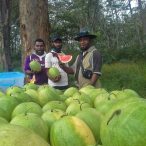
Papua New Guinea – Kevin Gabriel of Jiwaka Province was able to attend a training in Fiji on off-season cropping of fruits and vegetables. Upon returning home, he used his experiences in Fiji to form the Jiwaka Youth in Agriculture Association and put his learning into practice. Today, the Jiwaka Youth in Agriculture Association is involved in many agricultural projects including capsicum, watermelon, papaya, and cabbage. They also have a gender equality component to their work, making sure young women farmers have opportunities and are welcomed.
Early on, one of their commodity groups, the capsicum farmers, managed to secure themselves a contract to supply a local retail outlet twice a week. This regular source of year-round income provided a steady wage to the young farmers, which helped them to get started on a better life for themselves and their families.
Three years later and Kevin and the Jiwaka Youth have grown to around 250 members, from their initial 25, and they now have contracts for both capsicum and watermelon. They are supplying 1000 kilograms of capsicum every week, and 600 kilograms of watermelons every fortnight to one of the largest supermarket chains in Papua New Guinea. This is the first time that watermelons have been successfully produced in the highlands of PNG, having previously been a crop only of the coastal areas.

Kevin still feels that his team is a semi-commercial operation and is pushing towards going fully commercial and securing contracts in other provinces. To do this, they are looking to make better use of information and communication technologies as a way of connecting with new markets. To support this, the national implementing agency for the MTCP2 Programme in Papua New Guinea has been able to connect them with a training opportunity on E-Agriculture run by the Food and Agriculture Organisation of the United Nations.
In fact, Maria Linibi, from the PNG National Implementing Agency has been a regular advisor and supporter of Kevin and the Jiwaka Youth over the years and follows their progress very closely.
Meanwhile, these regular contracts are paying off for the Jiwaka Youth and many of them are now able to build proper houses for their families. There has also been a noticeable shift in how Kevin and the other young farmers are treated in their communities. Their successful farming activities haven’t gone unnoticed and people now treat the youth farmers with more respect and listen to them when they speak. #
About MTCP2
The Medium-Term Cooperation Program Phase 2 (MTCP2), a five-year capacity building program supported by the International Fund for Agricultural Development (IFAD), the Swiss Agency for Development and Cooperation (SDC), and the European Union (EU), has been implemented in 19 countries across three sub-regions—Southeast Asia, South Asia, and the Pacific—engaging 1,544 sub-national farmers organizations (FOs) with a total membership of around 22 million farmers. The funding support (total budget of $ 5 million for the whole duration of the project across 19 countries) serves as a catalytic fund that will allow FOs to enhance their capacity to be effective channels of economic services to farmers. The program has contributed to the formation of the strong national platform of FOs with improved capacity to engage in policy processes and mobilize resources from mainstream agricultural development programs like extension services, credit, and pre and post-harvest facilities. The program also helped in transforming farmers’ associations into commodity-based cooperatives to strengthen the role of small-scale farmers within an inclusive and sustainable value-chain. The program is being implemented by the consortium Asian Farmers’ Association for Sustainable Rural Development (AFA) and La Via Campesina (LVC).

Comments are closed